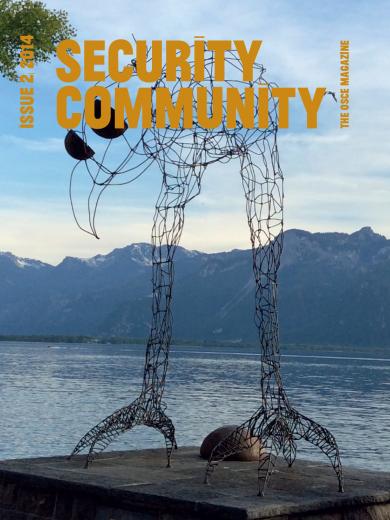The OSCE in Ukraine Update: March 2014 to May 2014
Mediation and negotiation
OSCE Chairperson-in-Office, Swiss President and Foreign Minister Didier Burkhalter has intervened throughout the crisis to find a diplomatic solution. Secretary General Lamberto Zannier has travelled to various capitals, including Moscow and Kyiv, to defuse tensions and offer OSCE action.
Seasoned Swiss diplomat Heidi Tagliavini is representing the OSCE Chairmanship in a Tripartite Contact Group that also includes Ukraine and the Russian Federation for negotiations aimed at ending violence in Ukraine.
National Unity Roundtables led by the Ukrainian government are part of a roadmap by the OSCE Chairperson-in-Office for implementing the Geneva Joint Statement of April 17. So far, three roundtable meetings chaired by Chairmanship representative Wolfgang Ischinger were held in May in Kyiv, Kharkiv and Mykolaiv.
The Chairperson-in-Office appointed Swiss Ambassador Tim Guldimann as Personal Envoy on Ukraine.
OSCE Parliamentary Assembly delegations have met for talks aimed at defusing tensions.
Monitoring
The Special Monitoring Mission in Ukraine was deployed within 24 hours following a consensus decision by all 57 participating States on 21 March. It is one of the OSCE’s largest monitoring missions. Ten teams of unarmed civilians monitor the security situation in Kherson, Odessa, Lviv, Ivano-Frankivsk, Kharkiv, Donetsk, Dnipropetrovsk, Chernivtsi and Luhansk. There are currently more than 250 civilian unarmed monitors from more than 40 OSCE participating States.
The monitors work in small groups on a shift basis to ensure cover on the ground 24 hours a day, seven days a week.They engage with authorities, civil society, ethnic and religious groups and local communities to reduce tensions and monitor the fulfilment of the agreements achieved. They gather information and reports facts in response to specific incidents. Their daily updates are posted on the OSCE website.
Election observation
The Office for Democratic Institutions and Human Rights deployed its largest election monitoring team ever, 1,000 observers, to the 25 May Ukrainian presidential election.
One hundred long-term observers arrived in Ukraine on 20 March to assess compliance with the OSCE commitments and provide recommendations for improvement. They were joined by 900 colleagues just before election day to monitor the counting and tabulation of election results. The team presented its statement of preliminary findings and conclusions in Kyiv on 26 May, the day after the election.
The OSCE Parliamentary Assembly sent a mission to observe the presidential election. Parliamentarians travelled to Kyiv in late March to meet with the acting president and other senior officials and Parliamentary Assembly President Ranko Krivokapic visited both Kyiv and Moscow to discuss the upcoming elections and prospects for inter-parliamentary diplomacy.
Human rights assessment
A joint Human Rights Assessment Mission sent to Ukraine from 18 March to 12 May by the Office for Democratic Institutions and Human Rights and the High Commissioner on National Minorities visited Donetsk, Kharkiv, Kherson, Kyiv, Lviv, Mikolayiv, Odessa and Simferopol and the surrounding regions. A report was released on 12 May 2014.
OSCE High Commissioner on National Minorities Astrid Thors travelled to Kyiv and Simferopol in early March to assess the situation for national minorities, especially regarding the Crimean peninsula. She visited Ukraine again a month later and posted her comments online.
Representative on Freedom of the Media Dunja Mijatović visited Kyiv and Crimea from 4 to 7 March and travelled to Ukraine again from 14 to 16 April. She has made continuous statements on media freedom and issued a report on media freedom situation in Ukraine from November 2013 to May 2014.
Military verification
Unarmed military experts from participating States were deployed to southern and eastern Ukraine from 5 to 20 March at the request of the Ukrainian authorities. The visit took place under Chapter III of the Vienna Document 2011 on military confidence and security building measures, which provides for voluntary hosting of visits by a participating State to dispel concerns about unusual military activities.
After 20 March, smaller inspection teams of unarmed uniformed military experts from participating States working on behalf of their countries have been on the ground in Ukraine under the Vienna Document 2011.
In addition, requests for consultation and co-operation as regards unusual military activities were made under the Vienna Document 2011 by Canada, Estonia, Ukraine and the United States addressed to the Russian Federation. They led to three joint meetings of the Forum for Security Co-operation and the Permanent Council on 7, 17 and 30 April 2014.
Permanent presence
The Project Co-ordinator in Ukraine is the permanent OSCE field presence based in Kyiv. It has run several projects in response to the crisis.
The four-week National Dialogue Project from 20 March to 30 April 2014 gathered information about social, humanitarian and minority issues in different regions of the country that could be addressed through dialogue. Fifteen unarmed international expert civilians visited Odessa, Kharkiv, Luhansk, Dnipropetrovsk, Donetsk and Lviv and surroundings. They spoke with local authorities and NGOs and followed public events to gather information about issues of concern. Their recommendations for future OSCE engagement to foster social cohesion and dialogue in Ukraine were presented to all participating States at the Permanent Council in Vienna on 30 April 2014.
Welcome to Security Community
Security Community is the OSCE’s online space for expert analysis and personal perspectives on security issues.
The views expressed in the articles are those of the authors and do not necessarily reflect the official position of the OSCE and its participating States.

